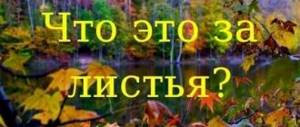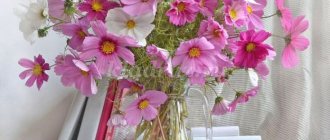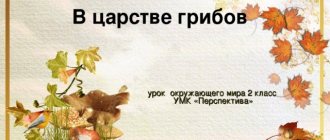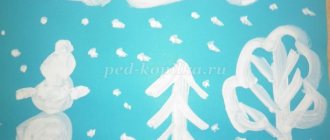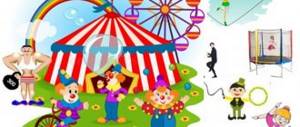Summary and presentation for the lesson “Lesson of Peace”
PEACE LESSON
2nd grade on the first of September
primary school teacher, Municipal Educational Institution "Zaprudnenskaya Gymnasium"
Matskova Alla Alexandrovna
Subject:
“Peace Lesson”
Objectives:
To teach second-graders to care about others, help their comrades, respect their opinions; Teach children to live according to the laws of goodness and justice, to correlate their interests with the interests of their classmates; To educate, develop and enhance the best qualities of a person: patriotism, citizenship, pride in one’s Motherland, the desire for peace.
During the classes:
Teacher:
— Dear children, parents, guests, I am very glad that we have gathered again for the first school holiday, Day of Knowledge. Guys, your first summer holidays are over and the new school year has begun. You have already learned a lot, learned a lot, and now you are already second graders. Today is our first lesson and we will talk about very serious and important things. But first, I want our class to be decorated with one of the most amazing and beautiful natural phenomena, and you will find out what this is by solving the riddle.
)
For a moment, the Multicolored Miracle Bridge grew into the ground.
A miracle - the master made a high bridge without railings. (Rainbow.) A rainbow will now appear in our class, but not a simple one, but a magical one, the words that will be discussed today will appear on it. The words appear as the children complete tasks: 1. Solve the puzzle (WORLD)
2. Guess the riddle (MOTHERLAND)
I love the field and birch trees, And the bench under the window. When I get bored, I wipe away my tears, Remembering my family. I won’t go anywhere, I will work here, live here, I will always love a place dear to my heart! I know this place, do you know, friends?
3. Answer the question What is the name of our homeland?
RUSSIA 4. Guess the riddle (FAMILY)
What in this world can’t adults and children live without?
Who will support you, friends? Your friendly... (family) 5. Solve the puzzle (HOUSE)
6. (FRIENDSHIP)
Teacher:
(Words appear on the rainbow) Well done guys, we’ll talk about all this today.
Teacher:
What is the world?
Teacher:
You are right, the world is what surrounds us: grass, sun, sky, trees, birds, bugs, spiders. But let's turn to the dictionary. What does the word PEACE mean? 1. WORLD – Universe, planet, globe, as well as population, people of the globe. 2. PEACE – friendly ties, agreement between anyone, absence of war; silence, peace; agreement to end the war.
The symbol of peace is a dove.
WHY IS THE DOVE THE BIRD OF PEACE?
It all started back in ancient times. People believed that the pigeon did not have a gallbladder, and therefore it was pure and kind. Many nations revered it as a sacred bird, a symbol of fertility. In the Bible, a white dove brought Noah (peace be upon him) an olive branch, which told about the reconciliation of the elements and the end of the flood. There are many folk beliefs in which this bird appears.
And in 1949, at the World Peace Congress, held in Paris and Prague, this bird from Pablo Picasso’s painting, carrying an olive branch in its beak, was taken as a symbol.
Teacher:
— What proverbs about the world do you recognize?
task: collect a proverb. (on the board) Proverbs: Peace builds, war destroys. Peace on the planet - happy children. Stand together for peace - there will be no war. A bad peace is better than any quarrel. - Read and explain the meaning of the proverb. Teacher:
It turns out that September 1 is celebrated not only as the Day of Knowledge, but on this day the Day of Peace is celebrated all over the world. On September 1, 1939, 78 years ago, the Second World War began. Nations learned many lessons from it, but the main one was that war must be fought before it begins. The history of our country is interesting and diverse. Our people have repeatedly defended it from enemy attacks. One of the greatest events was the Great Patriotic War against the Nazis. Our soldiers drove the enemy from Russian soil. Among the soldiers were our fellow countrymen. What helped our people survive this great battle? (Friendship of peoples, love for one’s Motherland.) What is the name of our Motherland? If we fly for a long, long, long time on an airplane, If we look at Russia for a long, long, long time. Then we will see forests and cities, ocean expanses, ribbons of rivers, lakes, mountains...
Russia is our big Motherland. In addition to the big Motherland, every person also has a small Motherland. —What do you think a small Motherland is? (statements from the guys) Small Motherland is the place where your home is, where your parents are, where you grow up, study, play with friends. — Our Small Motherland is the village of Zaprudnya. Small Motherland - An island of land. There are currants under the window and the cherries have blossomed. A curly apple tree, And under it there is a bench - My affectionate little Motherland! MINE - because here is my family, my friends, my home, my street, my school... SMALL - because this is a small part of my vast country. HOMELAND - because people dear to my heart live here. Teacher
Each of you has your own path in life, your own path, but let in the heart of each of you live love for your native land, native land, hometown and the street on which you lived, LOVE FOR YOUR SMALL HOMELAND. Every person must bring benefit, invest a piece of his soul for the good of his homeland. - What can we do now for our small Motherland? (study, plant trees, take care of reservoirs, monuments, love and respect your parents, your family)
Teacher Popular wisdom says: To cherish your family is to be happy.
- Do you think our class can be called a family? (children's opinions).
Teacher
You are right in thinking that our class can be called a family.
Of course, we are not relatives, but we see each other every day at school and in the yard, together we learn something new, rejoice at victories and are upset by failures. It’s not for nothing that teachers are called cool moms. I would like our class to remain such a family until graduation and become even more friendly. -Look around, there are 21 of us. And each of us is unique. But together we are one family, which means we need a home. And now we will build it. There are bricks hanging on the classroom walls. You need to collect them. But not all bricks are suitable for us to build a house. Determine for yourself which bricks are suitable for us. (bricks: understanding, love, respect, trust, kindness, care, help, friendship, rudeness, evil, envy, lies) Students build a house on the board. Well done! For any family to live happily, it must be dominated by Understanding Love Respect Trust Kindness Care Help Friendship And how friendly you are and remember the rules of behavior at school, we will now check. I read the sentence, and you finish it. Early in the morning, the (sun) peeks into the classroom window. Just as we enter the office, we say to everyone (hello) There is a law in our class. Entrance for slobs (prohibited) A desk is not a bed and you can’t (lie on it) Don’t chat in class like an overseas person. (parrot) We need paints for drawing, And we will read (fairy tales) If you want to answer, don’t shout, Just raise your hand (raise) To get an A. Everyone needs to learn lessons (learn) Go to the blackboard - don’t be silent Lesson faster (answer) Teacher
- Well done, guys, you haven’t forgotten the rules of behavior at school and in class. Our first lesson of the new school year has come to an end. Today we touched upon the most important topics in life. Even though you are still children, if every person on our planet from a very early age thinks that the most important thing in life is peace, love, family, friendship, we will never have wars. I wish you all good health and success in your studies. I really hope that at school you will behave with dignity and be friendly. Let all your knowledge acquired at school remain with you and help you overcome life's difficulties. Good luck, dear second graders!
The world is building
war destroys. Peace on the planet - happy children.
Stand together for peace - there will be no war. A bad peace is better than any quarrel.
| understanding | Love |
| respect | confidence |
| kindness | care |
| help | friendship |
| coarseness | evil |
| envy | lie |
Lesson. “Political regimes” 9th grade.
Lesson type: lesson on learning new things.
Goals:
- reveal the essence and main features of political regimes;
- continue to develop thinking skills, skills to form concepts, develop the ability to identify features, and the ability to work with texts;
- develop the ability to compare, analyze, draw conclusions, rationally solve cognitive and problematic problems, reveal the most important theoretical positions and concepts of the social sciences and humanities using examples;
— to form students’ attitude towards political systems;
— correction of thinking based on exercises in analysis and synthesis.
Equipment: textbook: L.N. Bogolyubov, N.F. Vinogradova, N.I. Goretskaya and others. Social science. 9th grade educational for general education institutions - Education, 2013; task cards, presentation
Basic concepts: political regime, democracy, totalitarianism, authoritarianism.
During the classes:
I. Org. Moment.
Speech warm-up.
II. Learning new things.
Today we will study another basis of the political life of any state. This basis is the method of exercising state power. And to begin with, I suggest you listen to a short parable.
“One day Confucius was passing near a mountain. Some woman sobbed loudly over the grave. Bowing as a sign of respect, Confucius listened to her sobs, and then sent his disciple to the woman, and he asked her:
“You’re so upset, it looks like this isn’t the first time you’ve grieved?”
“So it is,” answered the woman. “Once upon a time my father-in-law died from the claws of a tiger, then my husband died from them, and now my son also died from them.
- Why don’t you leave these places? - asked the student.
“There is no cruel power here,” the woman answered.
After hearing this, the student returned to Confucius and, telling about what he heard from the woman, asked Confucius: “Why did the woman compare power to a tiger?” Confucius replied: “Remember, student, cruel power is fiercer than a tiger.”
And, indeed, at all times, from the very beginning of the manifestation of signs of the state, society was looking for the most ideal form of state power, because a lot depends on the way in which power is exercised in society. Based on this, our today's lesson “Political Regimes”
Recording the topic and plan in a notebook.
PLAN:
1. The concept of “political regime”.
2. Types of political regimes.
1. The concept of “political regime”
Exercise 1.
Work on the Card.
Find the definition of the concept “political regime” in the text of the textbook on page 21.
Political regime -
This __________________________________________________________________________________
Political regime -
these are the ways and means by which the state influences society, exercising its power.
Political regime -
This is HOW state power is exercised in a country.
(Write the definition in a notebook)
Task 2.
Using the textbook text on pp. 21-25, fill out the “Types of Political Regimes” chart.
(Write the finished diagram in a notebook).
2. The concept of “political power.”
Task 3.
Using the textbook text, analyze all types of political regimes.
(Write the table in a notebook)
III. Generalization
IV. Consolidation
Exercise 1.
Name the words correctly, placing emphasis.
Political regime, democracy, totalitarian, authoritarian.
Frontal survey:
— What does the word “Political regime” mean?
— What are the main types of political regimes?
—What characterizes a totalitarian regime?
— Compare totalitarian and authoritarian regimes, indicate common features and differences.
— How is the control of power ensured in a democracy?
Task 2.
Choose the correct answer. Which of the following refers to the form of a political regime?
1) republic
2) union
3) authoritarianism
4) monarchy
Task 3.
Are the following statements about political regimes true?
A. A democratic regime is characterized by political freedom of citizens and equality of all before the law.
B. In the modern world, states with features of totalitarianism have been preserved.
1) only A is correct
2) only B is correct
3) both judgments are correct
4) both judgments are incorrect
Task 4.
Establish a correspondence between the characteristics and types of political regime: for each position given in the first column, select the corresponding position in the second column.
Write down the selected letters under the corresponding numbers in the table.
V. Lesson summary.
1. Reflection.
2. Assessing student work. Making marks.
3. Homework. Learn the notes in your notebook.
You can download the lesson notes here.
You can download the presentation for the lesson here.
